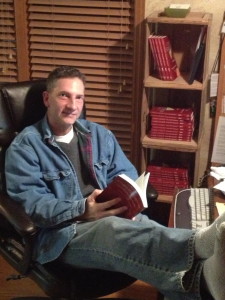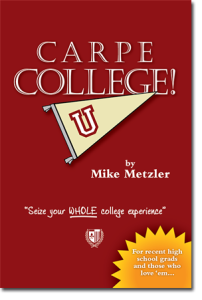 Q: So, why does anyone need a book like this?
Q: So, why does anyone need a book like this?
A: Having worked with both high school and college students, I believe today’s teens have a tougher time managing expectations, their own and others’, than previous generations….at least when it comes to their academic and social lives. Combine the heightened pressure to succeed academically, the increased pace of learning, and the complexity of their social lives (including social media), and you realize it’s tough terrain out there. Because college is such an important step for a young person, it helps to have a little assistance from a perspective in addition to your parents.
Q: Is there a theme that captures what this book is about?
A: Yes, and it’s in the title, Carpe College!. Making the most of your college experience is about seizing opportunities inside and beyond the classroom. I reference three ‘gurus’ in the book who set the table for everything else. Joseph Campbell implores us to ‘follow your bliss.’ Thoreau said he wanted to ‘live deep.’ And Mark Twain said he ‘never let schooling get in the way of his education.’ These are all great approaches to seizing the richness of the whole college experience.
Q: What are some of the key points you touch upon?
A: First, I encourage students to take a tough look at themselves and ask whether certain aspects of their high school experience made them passive. If so, they need to leave that bad habit behind when they get to college. For example, did they tend to wait for the teacher to serve up an assignment and then ‘jump through that hoop’ without much thought or effort? Did they slide through senior year worrying more about prom than any academic passion? If so, then they may wish to rethink their mindset for college. There’s so much to explore in college, you just can’t sit back and wait for it to tap you on the shoulder like you may have done in high school.
I tell students that a great way to shed such passivity is to become more ACTIVE and INTENTIONAL about the choices they make both in and out of the classroom.
Q: So, how does a student become more active and intentional?
A: I offer a mantra in the book that can help mold a student’s mindset in this regard: ‘Know thyself, have a plan, and assume no one else cares.’ This approach encompasses all aspects of college life, from academics to everything else. You can know yourself in terms of how good you are at taking lecture notes or whether you make friends easily. You can have a plan for studying during the week and another for meeting people in your dorm. You can assume no one else cares whether you fail a test or whether you remembered to buy your ticket to the football game. Whatever it is, this mantra can be your guide to help control your own destiny.
Q: From a planning standpoint, where should students begin?
 A: Actually a good way to begin is to forecast what you want in the end. I often ask first-year students what I call ‘The June Question.’ I remind them that at the end of their first year, in June, they will be done with school, attending some sort of social gathering, and they will be asked, “Hey, how did your first year go?” They agree that question will definitely be coming, and they should be prepared for it. “What do you want to be able to say when that June Question comes?” I ask. That’s the beginning of the kind of reflection needed to identify their goals, to set their sites on those goals, and to develop strategies to achieve them. Again, whether it’s getting on the dean’s list or walking away from their first year with two really good friends, students can be reflective, active and intentional about getting there. (Of course, this forecasting approach can be applied to one’s entire college career, too.)
A: Actually a good way to begin is to forecast what you want in the end. I often ask first-year students what I call ‘The June Question.’ I remind them that at the end of their first year, in June, they will be done with school, attending some sort of social gathering, and they will be asked, “Hey, how did your first year go?” They agree that question will definitely be coming, and they should be prepared for it. “What do you want to be able to say when that June Question comes?” I ask. That’s the beginning of the kind of reflection needed to identify their goals, to set their sites on those goals, and to develop strategies to achieve them. Again, whether it’s getting on the dean’s list or walking away from their first year with two really good friends, students can be reflective, active and intentional about getting there. (Of course, this forecasting approach can be applied to one’s entire college career, too.)
On a larger level, it’s all about becoming a more reflective person. As students try to ‘know themselves,’ I realize they are young and emerging adults, and that they still have a lot to discover about who they are and who they will become. However, they can begin by periodically asking, “Who am I, where am a going, why, and how?” These are great questions to ask before heading off to school and during each break over your college career. It helps students think big about their aspirations and directions, and it helps them develop a framework for how they’re doing in relation to what’s important to them. (There are even some helpful worksheets in the book to guide this kind of thinking.)
Q: But it’s not always as smooth as you’re laying out here.
A: No, it is not. And I’ve developed a memorable little strategy for that, too. I call it F3, which stands for Fix It, Forgive and Forge Ahead. As with the previous mantra, it can be applied to both your academic and non-academic life. Everyone needs to acknowledge that first-year students in a new and challenging environment with increased academic demands and more complicated social lives and living arrangements are going to make some mistakes. They just are! So, it’s very important to recognize that these missteps are part of learning and development, and that it can be destructive if we dwell on them too much rather than turning them into something instructive.
For example, let’s say you get to college, enjoy your newfound freedom a bit too much, and fail your first midterm. You FIX IT by learning to manage your time better, getting more serious and systematic about studying, and visiting your professor to discuss what went wrong on your exam. You can plan better by carving out more specific time each week for that particular course, using that time to review and rewrite notes from class, preview what’s coming, and attend sessions with a study group from class. Then, you FORGIVE yourself by recognizing that it’s a significant transition in your life in a completely new setting with new rules. It’s understandable that some stumbles will occur. In the end, you FORGE AHEAD by recognizing that what’s next is what matters, and you set about enacting your new plan. If you fix things by developing a more systematic plan with a more diligent approach, and you cut yourself a break, you can keep your eyes on the prize of successfully completing your first year (in the short-term) and attaining academic success over the long haul.
Let’s say you misstep on the social front. Maybe you have a bad encounter by drinking one too many beers, your roommate has to usher you home early, and you become rude and unkind to your dorm mates back on your floor. You can FIX IT by asking to hear all the gory details, apologizing individually to people, and throwing an impromptu pizza party in the lounge as a form of public apology. You could stay in for the next evening or, better yet, go out with the gang while staying sober, a great demonstration of your sincerity. You move forward and FORGIVE yourself by recognizing you’re not the first person to experience beer bubbles on the brain and have it affect your behavior. You’re only human, of course, but how you respond matters. If you do not change your behavior, it’ll be tougher to forgive yourself in the future, and to have other forgive you, as well. Finally, you FORGE AHEAD by reflecting on what went wrong and how to prevent it in the future. If you continue to drink socially, find your limits, or don’t even tempt your limits. Find an alternative to drinking. If it helps, imagine what your outward behavior might look like from an adult’s perspective (or in a Facebook photo). That ought to ensure you avoid future mishaps.
Q: Does this book offer anything for the non-traditional student?
A: Yes. While most of the book is directed toward students who will live on campus at a four-year college, there are several sub-groups whose special circumstances are addressed. There are sections for commuter students and student athletes, and there is also a collection of time management weekly planning templates geared toward students with part-time jobs and other demands.
Q: Speaking of part-time jobs, does your book address financial aid?
A: Indirectly, yes. The book acknowledges that most students need some sort of assistance to pay for college. When I address managing time for academics, social life, and other enrichment opportunities, I assume I am speaking to a student whose budget is tight. So, every suggestion is made with this consideration in mind. That’s why I place so much emphasis on students being active and intentional with their choices. If their radar is up, they will find wonderfully rich opportunities at very little cost.
Q: What’s the most important thing you’d like readers to remember?
A: It’s YOUR journey. Ask yourself who you are, where you want to go, and how you’d like to get there. Graciously accept advice from everyone, but don’t look left and right and wonder why you’re not taking the path of your peers. Enjoy the path you’re on and make the most of it. Carpe College!
About Mike Metzler








